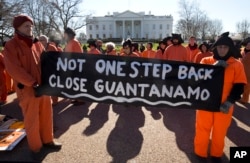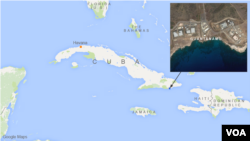The U.S. Defense Department says 10 Yemeni detainees have been released from U.S. detention center in Guantanamo Bay, Cuba and sent to the Middle East nation of Oman.
"The Oman transfer of 10 is the single largest transfer to a single country at one time under the current administration." Cmdr. Gary Ross said in an email to VOA.
The mass transfer will raise the number of detainees transferred out of the camp this year to 14. Officials have told VOA the administration is looking to transfer three more detainees later this month.
Thursday's transfer follows a forceful promise from President Barack Obama at his State of the Union address Tuesday to keep working to shut the prison down.
"It's expensive, it's unnecessary, and it only serves as a recruitment brochure for our enemies," Obama said.
Some held since 2002
Lawyers and activists say the United States has no right to indefinitely detain people without trial. Some of the Guantanamo Bay detainees have been imprisoned there since 2002.
"Indefinite detention does have rules, and the U.S. is not within those international rules as far as Guantanamo is concerned," said Gary Solis, a U.S. veteran who teaches the law of war at the Georgetown University Law Center.
There are now 93 detainees at the Guantanamo facility. The U.S. claims all have ties to terrorist groups.
A defense source close to the transfer process told VOA the mass transfer was due to "timing and security assurances" from those taking detainees.
Military plan for closure
The military will submit a plan to Congress by the end of February detailing how to close the detention facility, according to a defense official who spoke to VOA this week on the condition of anonymity.
U.S. officials surveyed prison sites in Kansas, South Carolina and Colorado as potential sites to house Guantanamo Bay's remaining terrorism suspects, but Congress has resisted moving the detainees into the United States.
"As the law stands now, the Department of Justice and the military may not, not cannot but may not, send these individuals to anywhere in the United States," Solis said.






